In Zambia, each year approximately 5.5 million people (33%) are infected with malaria, and more than 3,000 people are said to die from this disease. Kansai Paint has developed an anti-mosquito paint with the aim of creating a safe living environment.
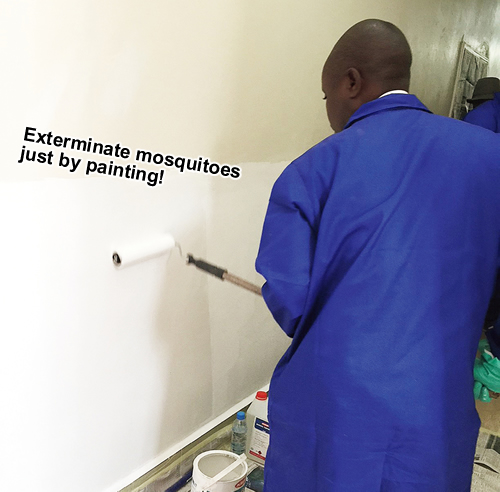
The AMP demonstration tests were initially carried out in three areas, after which two more areas were added. 400 households are currently involved.
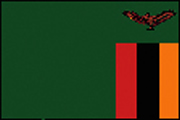
Zambia
Name: Republic of Zambia
Capital: Lusaka
Currency: Zambian kwacha (ZMW)
Population: 16.59 million (as of 2016 - World Bank)
Languages: English (official), Bemba, Nyanja, and Tonga
Located in southern Africa, Zambia is a landlocked country twice the size of Japan. It is well known as an area prone to malaria, and although the capital Lusaka has a relatively low rate of infection due to its high altitude, people still contract the disease throughout the year.
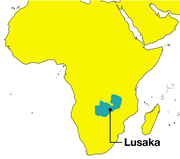
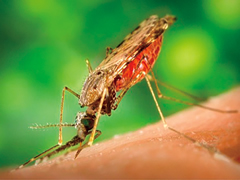
Mosquito-borne Infectious Diseases
These infectious diseases are caused by being transmitted by a pathogen-bearing mosquito. They include malaria, dengue, and Zika, and are common in tropical and subtropical areas.
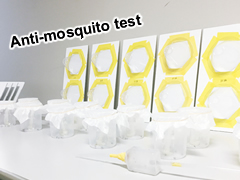
The cone test involved trapping mosquitoes inside a conical cup on a panel that had been coated with AMP. After forcing the mosquitoes to come into contact with the coated panel, the fatality rate was observed after 24 to 96 hours.
Anti-Mosquito Paint: Functional, Protective, and Beautifying
Kansai Paint, based in Osaka, Japan, is a global manufacturer of paints and coatings that is committed to helping people in developing countries who are vulnerable to the spread of infectious diseases. Through its affiliate networks in Southeast Asia and Africa, they understand how quickly and easily healthy local people can be struck down with an infectious disease.
In order to prevent infectious diseases such as malaria, dengue, and Zika, the company developed Kansai Anti-Mosquito Paint (AMP), an interior paint that contains an active ingredient that knocks down mosquitoes. AMP went on sale in 2014 in Malaysia, followed by Indonesia, Myanmar, Cambodia, Thailand, and Singapore.
Efforts to disseminate the technology have been underway in Zambia since 2017 as part of JICA's Private Sector Technology Dissemination Program in Africa. A study in which the paint was applied in 400 households in five different areas of the country has yielded very positive results. Comments like "I've previously had malaria twice, but never again since we applied the paint nine months ago" and "I used to have 20 to 30 mosquitoes in the room, but now there are only one or two" are frequently heard from participants.
Hiroyuki Nagano of Kansai Paint, who was involved in the development of the product, explains how it works: "The paint contains a substance that disrupts a mosquito's nervous system and has an insecticidal effect. It is safe, however, for us humans and most mammals because we can break down and excrete that substance. Not only does this paint protect our homes, it makes them more beautiful, which also has a positive psychological effect."
Collaboration with JICA Made it Possible
Although demonstration tests are still ongoing, the Zambia Environmental Management Agency has already acknowledged the benefits of AMP and has certified and approved it for sale from October 1, 2018, six months ahead of the company's expectations.
"This success would not have been possible if we had been working alone," says Toshikazu Kutsuna, head of the company's dissemination activities. "Although work on this project started back in 2015, at that time the Zambian government had no relevant testing standards because using paint to exterminate mosquitoes was a brand-new concept to them. It took some time to develop evaluation methods, and talks ground to a halt," he continues.
"We explained to them that the product was sound, but I guess it wasn't convincing since we were the ones selling the product. We then started to work with JICA, and things started to go more smoothly. JICA was well aware of the situation in Zambia and was closely acquainted with key people working in government institutions. Thanks to their advocacy we were able to talk with all the right people, and the Zambians came to have a more positive stance and accelerated the approval process. Staff who were involved at the time told me that it was like the fog had lifted."
Standard countermeasures against malaria currently include the use of treated mosquito nets and spraying of insecticides. In the future we expect such measures to also include AMP, allowing even greater results to be achieved. Significant progress has been made in the field of infectious disease control thanks to Japanese technology.
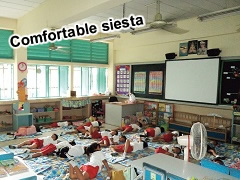
Tests using AMP were also carried out at a primary school in Thailand. Because mosquitoes would avoid the classroom where AMP was applied, many children came to the classroom to sleep during the afternoon break.
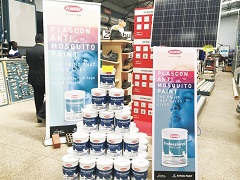
AMP is on sale in ASEAN countries, as well as African countries such as Zambia and Uganda. It has no detrimental effect on the human body, making it safe for use in homes, public facilities, and commercial establishments. AMP's effect lasts for two years.
Kansai Paint's Toshikazu Kutsuna (left) from the Corporate Headquarters and Hiroyuki Nagano (middle) from the Paint Division.
Messrs. Kutsuna and Nagano visited Zambia at the beginning of November 2018 to conduct demonstration tests. Their efforts garnered much attention in the local media.

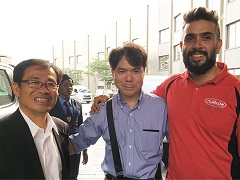




scroll